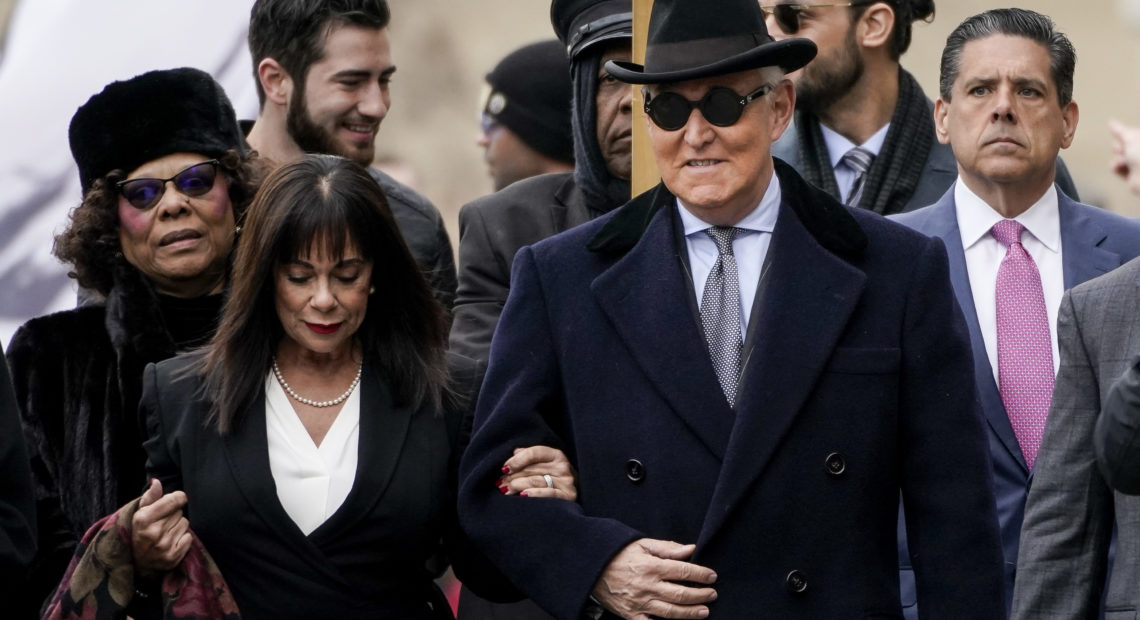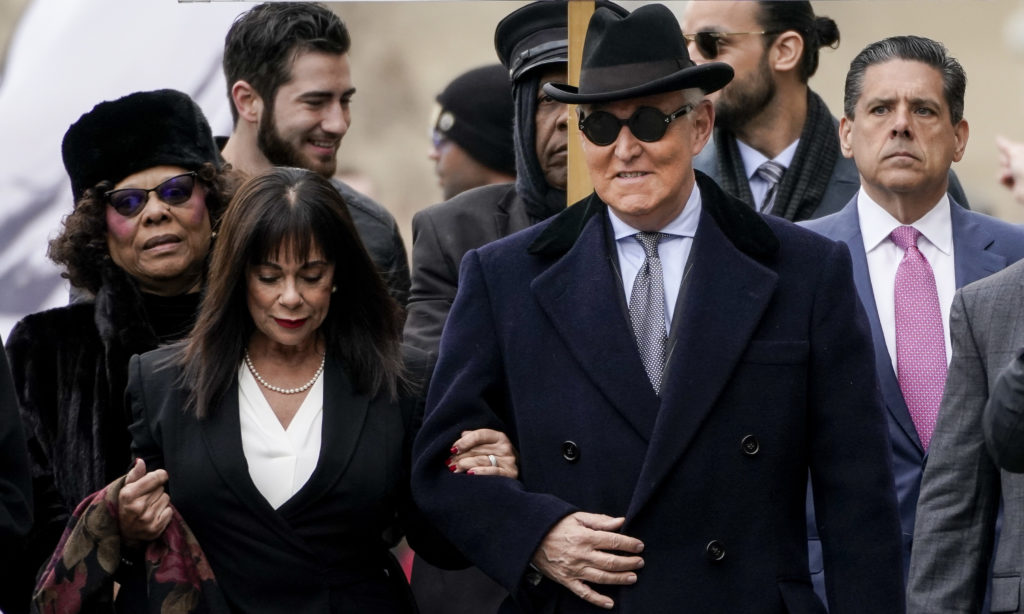
Roger Stone Sentenced To More Than 3 Years Amid Controversy Over President Trump And DOJ
BY RYAN LUCAS & PHILIP EWING
A federal judge sentenced Roger Stone, President Trump’s political adviser, to more than three years in prison on Thursday amid an uproar about what critics call Trump’s interference in the workings of justice.
Judge Amy Berman Jackson found herself in the middle of a political sandstorm as she and the parties closed in on sentencing for Stone following his conviction last year.
A jury found Stone guilty of lying to Congress, obstructing its investigation and witness tampering. Prosecutors initially recommended that he receive a sentence of between seven and nine years in prison.

Roger Stone, former adviser to President Trump, arrives at the E. Barrett Prettyman U.S. Courthouse on Thursday in Washington, D.C., with his wife, Nydia. CREDIT: Drew Angerer/Getty Images
Attorney General William Barr thought that suggestion was too severe and, according to his account, decided to order the U.S. Attorney’s Office for Washington, D.C., to file a second memo calling for less prison time.
Over the same period of hours, Trump criticized the initial sentencing recommendation on Twitter and, separately, praised Barr for, as the president put it, “taking charge” of the case.
Trump drew criticism for the perception that he was involving himself in the workings of the Justice Department, which is supposed to be independent.
Even the loyalist Barr asked publicly for Trump to dial back his Twitter commentary because the discussion made his job “impossible,” Barr said.
Trump made clear in subsequent posts on Twitter and in person that he didn’t intend to stop and that he reserved the right to get involved at any time with Barr.
“I do make his job harder. I agree with that,” Trump told reporters on Tuesday.
Although the president said he has chosen not to exercise what he called his privilege to do so, he added, “I’m allowed to be totally involved. I’m sort of the chief law enforcement officer … I could be involved if I wanted.”
The same day, Trump used his clemency powers on a number of high-profile convicts, including former Illinois Gov. Rod Blagojevich and former New York City Police Commissioner Bernie Kerik.
Stone’s friends have formed a group to advocate that he, too, should receive a pardon. Trump has been asked many times whether he might offer clemency to people convicted in the Russia imbroglio and the president hasn’t ruled anything out.
Trump criticized the handling of Stone’s case on Thursday even as it was underway in court.
Government apologizes for “confusion”
Jackson addressed the controversy over the government’s sentencing memos, and grilled the federal prosecutor representing the government Thursday. He was contrite.
“I want to apologize to the court for the confusion the government has caused regarding sentencing. I want to make clear to the court that this confusion was not caused by the original trial team. It had authorization to submit the original sentencing memo Monday before last,” said Assistant U.S. Attorney John Crabb Jr.
Four federal prosecutors who had been handling the case withdrew from the case last week, hours after the Justice Department intervened.
Jackson pressed Crabb for more information on the process that led the government to file the supplemental memo.
Crabb told her that there was a miscommunication between the U.S. Attorney for the District of Columbia and Barr about the filing. But the government stands by its case.
“The Justice Department and the U.S. Attorney’s Office is committed to enforcing the law without fear, favor or political influence This prosecution was and is righteous,” Crabb said.
Jackson asked Crabb, who signed the supplemental memo, whether he wrote it. Crabb said he couldn’t discuss internal deliberations.
Asked whether he was directed to sign it by someone else, he again said he couldn’t discuss the matter.
More than 1,000 former Justice Department lawyers and employees have called on Barr to step down rather than continue to go along with what they’ve called Trump’s improper takeover.
A number of Senate Democrats also have said Barr must resign.
The Stone matter
Stone sought to serve as an intermediary between Trump’s campaign in 2016 and WikiLeaks, which was releasing material stolen by Russian cyberattackers aiming to embarrass political targets in the United States.
Trump and his top advisers believed that Stone had some kind of inside line with WikiLeaks and its boss, Julian Assange, and that Stone either could get material for the campaign’s use or at least get previews about when more revelations were coming.
In fact, Stone’s attempts to use his own network to get through to Assange appeared to fall short, although he suggested in public that he was looped in about WikiLeaks’ plans.
When lawmakers on the House Intelligence Committee questioned Stone about what had taken place, he lied about his contacts and the material in his possession, prosecutors said.
“Stone’s false statements about documents had a significant impact on the committee’s investigation,” prosecutors wrote in their first sentencing memo. Stone also sought to dissuade a contact of his, Randy Credico, from talking on his own to House investigators.
That was the episode in which Stone invoked a moment from the movie The Godfather Part II in which a mob informant, Frank Pentangeli, declines to give testimony to a Senate committee after earlier implicating a crime boss privately to investigators.
“As Credico testified at trial, when Stone told Credico to ‘do a Pentangeli,’ Credico understood Stone to mean that Credico should ‘throw them off, rebuff’ and ‘divert’ the committee by falsely claiming not to recall any of the conversations Credico had with Stone or the events that had transpired,” prosecutors wrote.
The guidelines
The totality of the false statements, the witness tampering and the unanimous finding of guilt by jurors merited the seven to nine years in prison as contemplated by the federal sentencing guidelines, prosecutors wrote in the first memo.
Stone’s attorneys had asked Jackson for probation.
The second Justice Department sentencing memo didn’t recommend a set amount of time beyond saying that it believed Stone didn’t deserve prison time in the seven-to-nine-year range. The second memo also acknowledged the ultimate sentence was up to the judge.
Ultimately, Jackson calculated an offense level of 27, which, under federal guidelines, would mean a range of between around six or seven years in prison. That was the basis for her final ruling.
Defense attorney Seth Ginsberg urged the judge to ignore the noise about the case and bear in mind that Stone is a 67-year-old first-time offender with a family and friends.
“It’s important not to focus on the many things going on outside this courtroom, for the sentence the court is going to impose today is a sentence that will be imposed on a real person — not a media figure, not a political character, but a real person,” Ginsberg said.
Stone himself did not address his punishment on Thursday. He was given the the opportunity to offer a statement but declined.
“Your honor, I choose to remain silent at this time,” Stone said.















